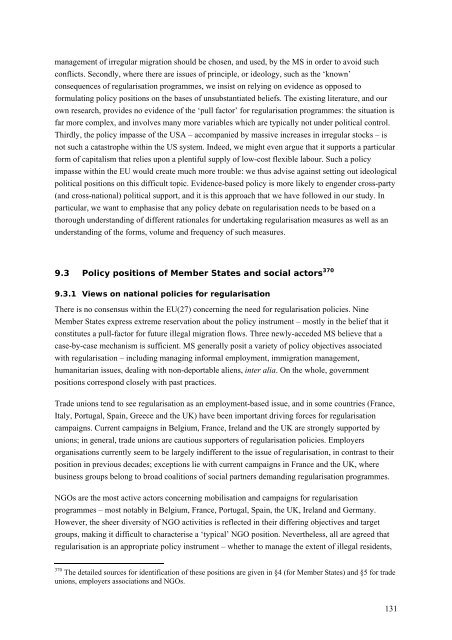REGINE Regularisations in Europe Final Report - European ...
REGINE Regularisations in Europe Final Report - European ...
REGINE Regularisations in Europe Final Report - European ...
You also want an ePaper? Increase the reach of your titles
YUMPU automatically turns print PDFs into web optimized ePapers that Google loves.
management of irregular migration should be chosen, and used, by the MS <strong>in</strong> order to avoid such<br />
conflicts. Secondly, where there are issues of pr<strong>in</strong>ciple, or ideology, such as the ‘known’<br />
consequences of regularisation programmes, we <strong>in</strong>sist on rely<strong>in</strong>g on evidence as opposed to<br />
formulat<strong>in</strong>g policy positions on the bases of unsubstantiated beliefs. The exist<strong>in</strong>g literature, and our<br />
own research, provides no evidence of the ‘pull factor’ for regularisation programmes: the situation is<br />
far more complex, and <strong>in</strong>volves many more variables which are typically not under political control.<br />
Thirdly, the policy impasse of the USA – accompanied by massive <strong>in</strong>creases <strong>in</strong> irregular stocks – is<br />
not such a catastrophe with<strong>in</strong> the US system. Indeed, we might even argue that it supports a particular<br />
form of capitalism that relies upon a plentiful supply of low-cost flexible labour. Such a policy<br />
impasse with<strong>in</strong> the EU would create much more trouble: we thus advise aga<strong>in</strong>st sett<strong>in</strong>g out ideological<br />
political positions on this difficult topic. Evidence-based policy is more likely to engender cross-party<br />
(and cross-national) political support, and it is this approach that we have followed <strong>in</strong> our study. In<br />
particular, we want to emphasise that any policy debate on regularisation needs to be based on a<br />
thorough understand<strong>in</strong>g of different rationales for undertak<strong>in</strong>g regularisation measures as well as an<br />
understand<strong>in</strong>g of the forms, volume and frequency of such measures.<br />
9.3 Policy positions of Member States and social actors 370<br />
9.3.1 Views on national policies for regularisation<br />
There is no consensus with<strong>in</strong> the EU(27) concern<strong>in</strong>g the need for regularisation policies. N<strong>in</strong>e<br />
Member States express extreme reservation about the policy <strong>in</strong>strument – mostly <strong>in</strong> the belief that it<br />
constitutes a pull-factor for future illegal migration flows. Three newly-acceded MS believe that a<br />
case-by-case mechanism is sufficient. MS generally posit a variety of policy objectives associated<br />
with regularisation – <strong>in</strong>clud<strong>in</strong>g manag<strong>in</strong>g <strong>in</strong>formal employment, immigration management,<br />
humanitarian issues, deal<strong>in</strong>g with non-deportable aliens, <strong>in</strong>ter alia. On the whole, government<br />
positions correspond closely with past practices.<br />
Trade unions tend to see regularisation as an employment-based issue, and <strong>in</strong> some countries (France,<br />
Italy, Portugal, Spa<strong>in</strong>, Greece and the UK) have been important driv<strong>in</strong>g forces for regularisation<br />
campaigns. Current campaigns <strong>in</strong> Belgium, France, Ireland and the UK are strongly supported by<br />
unions; <strong>in</strong> general, trade unions are cautious supporters of regularisation policies. Employers<br />
organisations currently seem to be largely <strong>in</strong>different to the issue of regularisation, <strong>in</strong> contrast to their<br />
position <strong>in</strong> previous decades; exceptions lie with current campaigns <strong>in</strong> France and the UK, where<br />
bus<strong>in</strong>ess groups belong to broad coalitions of social partners demand<strong>in</strong>g regularisation programmes.<br />
NGOs are the most active actors concern<strong>in</strong>g mobilisation and campaigns for regularisation<br />
programmes – most notably <strong>in</strong> Belgium, France, Portugal, Spa<strong>in</strong>, the UK, Ireland and Germany.<br />
However, the sheer diversity of NGO activities is reflected <strong>in</strong> their differ<strong>in</strong>g objectives and target<br />
groups, mak<strong>in</strong>g it difficult to characterise a ‘typical’ NGO position. Nevertheless, all are agreed that<br />
regularisation is an appropriate policy <strong>in</strong>strument – whether to manage the extent of illegal residents,<br />
370 The detailed sources for identification of these positions are given <strong>in</strong> §4 (for Member States) and §5 for trade<br />
unions, employers associations and NGOs.<br />
131
















